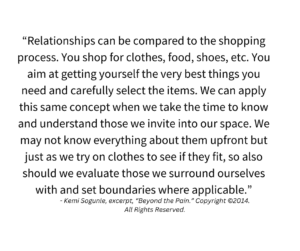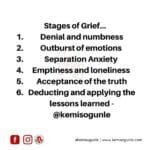Abusive Relationship and Trauma Bond
- By Kemi Sogunle
- In Blog, Courtship, Dating, Love, Marriage, Relationship, Single Life

Life is hard on its own not to think of experiencing an abusive relationship. The fear of not knowing where to go, what to do, who to trust…the guilt and shame, often leave partners hanging on to a string and staying in the abusive relationship.
You learn to become part of the abuser’s life and begin to develop a trauma bond. You believe the pain and sufferings are normal and you are afraid to leave as you never know what could happen if you make an attempt to do so.
Having children makes it difficult for you to want to exit. You think about the children and the emotional pain they will experience (you sometimes do not have time to process that leaving the children in the environment may cause them to suffer more emotional pain).
You form what is called a trauma bond. You become attached to the abuser. Your chemical imbalance takes place in your body without you knowing it. You believe that staying in the abusive environment will help the abuser become better and you do not want to hurt the abuser.
You may become more confused talking with people who have no idea of what you are going through. You want to stay because you believe it will get better but reality is that it gets worse by the day.
You have to come to the realization that you cannot allow yourself to be a dumpster for the pain/trauma you know nothing about.
To Break the Cycle and Challenge Yourself, you have to understand the following:
- It is not your fault. You may also have some buried trauma that are unaddressed and this led you to become loyal to the abuser. You have been conditioned to believe that pain is normal but you have to get professional support to begin to reprogram your mind and heal.
- Begin to journal events. Start writing down each event and deduce what you learned from them. This will help you face the reality and own your truth…it is the beginning of the grieving and healing process. Read more about grieving and healing in my books, Being Single: A State for the Fragile Heart and Beyond the Pain.
- Change the way you see things (Change Your Perspective). Ask yourself deep and thought-provoking questions: “What if you get out and become better?” “What if you stayed and your children become abusive?” “How does staying help improve your emotional and mental state of mind?”
- Stop allowing the abuser to play mind games with you. The mind games result in you becoming emotionally derailed and messed up. You start becoming numb to yourself and continue to find excuses to make the abuser feel better than you becoming better.
- Connect with your higher self. Start exploring spirituality and connect with your higher self. Gain conscious awareness to your true self and live healthy and purposefully.
- Get professional support. Find a professional who has gone through similar experience and understands your situation. A professional can help you without passing judgement and you will begin to learn to see from different perspectives while growing emotionally and mentally. Healing is essential to your growth and you need to heal to become better, stronger and wiser.
Still have questions or struggling with trauma from the past? Connect with me and let’s get started on the journey to breaking free and living healthy.
Get My Books




- Share:
You may also like

How to Resolve Conflicts in a Relationship
- March 23, 2025
- by Kemi Sogunle
- in Courtship

How to Heal From a Heartbreak


